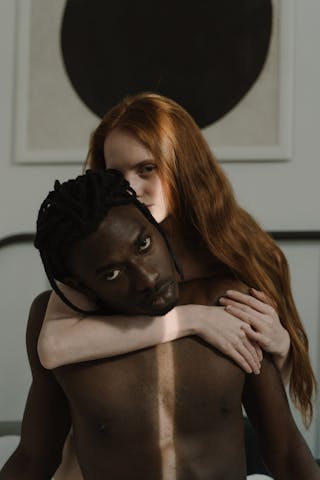The Importance of LGBT Inclusivity in Sex and Relationships Education
Are you ready to explore and embrace your desires in the dating world? Check out this website for hotwife hookups and connect with like-minded individuals who are open to exploring diverse relationships. It's important to feel included and supported in your dating journey, and this platform provides a safe and inclusive space for everyone to unleash their desires. Start your journey today and find the connection you've been seeking.
In recent years, there has been a growing awareness of the need for inclusive sex and relationships education in schools. As society becomes more accepting and understanding of different sexual orientations and gender identities, it is crucial that young people receive comprehensive and accurate information about all aspects of sexuality and relationships. This includes education that is inclusive of LGBT individuals and their experiences.
Check out this comparison of Hinge vs Silversingles and see which dating app is right for you.
The lack of LGBT-inclusive sex and relationships education has been a longstanding issue in many educational systems. For too long, young people have been denied the opportunity to learn about the full spectrum of human sexuality and relationships. This has had detrimental effects on the well-being and mental health of LGBT youth, who have often felt marginalized and invisible in their school environments.
Discover the exciting world of bondage in Minneapolis and try it out for a thrilling and unique experience.
Thankfully, there has been progress in recent years, with many countries and regions implementing policies to ensure that sex and relationships education is LGBT-inclusive. This is a positive step towards creating a more inclusive and accepting society, where all individuals feel seen and valued for who they are.
Explore the BDSM scene in Seattle with this comprehensive guide
Challenges and Misconceptions
Despite the progress that has been made, there are still challenges and misconceptions surrounding the implementation of LGBT-inclusive sex and relationships education. Some individuals and groups continue to resist the idea of including LGBT content in school curriculums, citing religious or moral objections.
However, it is important to recognize that sex and relationships education is not about promoting a particular lifestyle or agenda, but rather providing young people with the knowledge and understanding they need to navigate their own experiences and relationships. LGBT inclusion in sex and relationships education is about acknowledging the existence and validity of diverse sexual orientations and gender identities, and ensuring that all young people have access to accurate and non-judgmental information.
The Benefits of LGBT-Inclusive Education
There are numerous benefits to providing LGBT-inclusive sex and relationships education. For one, it helps to create a more supportive and inclusive school environment for LGBT students. When young people see themselves reflected in their education, they are more likely to feel accepted and understood by their peers and teachers.
Additionally, LGBT-inclusive education can help to reduce stigma and discrimination towards LGBT individuals. By providing accurate information about diverse sexual orientations and gender identities, young people can develop a greater understanding and empathy towards their peers, leading to a more inclusive and respectful society as a whole.
Furthermore, LGBT-inclusive sex and relationships education can help to empower young people to make informed and healthy choices about their own relationships and sexual health. By learning about the full spectrum of human sexuality, young people can develop a better understanding of their own identities and desires, and feel more confident in seeking support and resources when needed.
Moving Forward
As we continue to advocate for LGBT-inclusive sex and relationships education, it is important for educators, policymakers, and parents to work together to ensure that all young people have access to comprehensive and inclusive education about sexuality and relationships. This means providing resources and training for educators, addressing misconceptions and resistance, and advocating for policies that prioritize the well-being and inclusion of all students.
Ultimately, LGBT-inclusive sex and relationships education is about creating a more accepting and understanding society, where all individuals can live authentically and without fear of discrimination. By prioritizing inclusive education, we can help to create a future where all young people feel seen, valued, and empowered to navigate their own experiences and relationships.
- https://online-dating.fu-direct.net/posts/pool-sex-stories-from-14-people/
- https://sex-chat.themountaintopplay.com/posts/creating-an-asexual-character-for-tv-showed-me-we-have-a-way-to-go/
- https://datingguide.fu-direct.net/posts/best-sex-positions-41-of-the-best-sex-positions/
- https://online-sex.themountaintopplay.com/posts/how-to-come-at-home-for-christmas-expert-sex-tips-for-the-holidays/
- https://sex-chat.campsupernow.com/posts/my-best-sex-ever-was-with-a-stunt-double/
- https://flirting-online.thehottieandthenottie.com/posts/reverse-cowgirl-reverse-cowgirl-sex-position-tips/
- https://datingguide.timebombrecordings.com/posts/lesbian-sex-positions-14-lesbian-sex-positions/
- https://sex-guide.thehottieandthenottie.com/posts/what-sex-during-pregnancy-feels-like-for-men-and-women/
- https://chat.getweps.com/posts/hot-sex-hot-sex-stories/
- https://sexting.ua-sex.com/posts/5-facetoface-sex-positions/
- https://flirting.themountaintopplay.com/posts/9-ways-to-make-your-boyfriend-better-at-oral-sex/
- https://sex-guide.getweps.com/posts/best-genderaffirming-sex-toys/
- https://free-dating-website.fu-direct.net/posts/sex-toy-company-lelo-gives-its-staff-annual-leave-to-masturbate/
- https://online-personals.themountaintopplay.com/posts/
